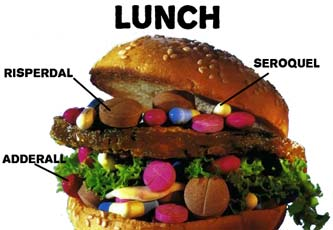Supreme Court Rules Against Pharma Preemption
In a 6 to 3 ruling, the U.S. Supreme Court has ruled against Wyeth (and by extension, the pharmaceutical industry) which claimed immunity from liability for failure warn about adverse drug effect by invoking FDA preemption:
The Court Held: Federal law does not pre-empt Levine’s claim that Phenergan’s label did not contain an adequate warning about the IV-push method of administration. Pp. 6-25.
Wyeth’s argument that requiring it to comply with a state-law duty to provide a stronger warning would interfere with Congress’ purpose of entrusting an expert agency with drug labeling decisions IS MERITLESS because it relies on an untenable interpretation of congressional intent and an overbroad view of an agency’s power to pre-empt state law.
The history of the FDCA shows that Congress did not intend to pre-empt state-law failure-to-warn actions. In advancing the argument that the FDA must be presumed to have established a specific labeling standard that leaves no room for different state-law judgments, Wyeth relies not on any statement by Congress but on the preamble to a 2006 FDA regulation declaring that state-law failure-to-warn claims threaten the FDA’s statutorily prescribed role.
Although an agency regulation with the force of law can pre-empt conflicting state requirements, this case involves no such regulation but merely an agency’s assertion that state law is an obstacle to achieving its statutory objectives.
Where, as here, Congress has not authorized a federal agency to pre-empt state law directly, the weight this Court accords the agency’s explanation of state law’s impact on the federal scheme depends on its thoroughness, consistency, and persuasiveness. Cf., e.g., Skidmore v. Swift & Co., 323 U. S. 134. Under this standard, the FDA’s 2006 preamble does not merit deference: It is inherently suspect in light of the FDA’s failure to offer interested parties notice or opportunity for comment on the pre-emption question; it is at odds with the available evidence of Congress’ purposes; and it reverses the FDA’s own longstanding position that state law is a complementary form of drug regulation without providing a reasoned explanation. Geier v. American Honda Motor Co., 529 U. S. 861, is distinguished. Pp. 17-25.
Stevens, J., delivered the opinion of the Court, in which Kennedy, Souter, Ginsburg, and Breyer, JJ., joined. Breyer, J., filed a concurring opinion. Thomas, J., filed an opinion concurring in the judgment. Alito, J., filed a dissenting opinion, in which Roberts, C. J., and Scalia, J., joined.
See: http://www.supremecourtus.gov/opinions/08pdf/06-1249.pdf
REUTERS
U.S. top court rules against Wyeth in liability case
Wed Mar 4, 2009 10:32am EST
By Lisa Richwine and James Vicini
WASHINGTON (Reuters) – The U.S. Supreme Court on Wednesday ruled against the drugmaker Wyeth, holding that pharmaceutical companies can be held liable for harm from medicines which carry warnings approved by federal regulators.
By a 6-3 vote, the high court ruled that labeling approvals by the U.S. Food and Drug Administration do not pre-empt state laws and shield companies from legal damages as part of liability claims.
A Vermont jury awarded $7 million in damages to a guitarist, Diana Levine. Part of her arm had to be amputated after she was improperly injected with the anti-nausea drug Phenergan made by Wyeth as part of treatment for a migraine.
The justices affirmed a Vermont Supreme Court ruling that upheld the award and rejected Wyeth's argument that labeling approvals by the FDA pre-empts state law liability claims.
"The question we must decide is whether the FDA's approvals provide Wyeth with a complete defense to Levine's tort claims. We conclude that they do not," Justice John Paul Stevens concluded in the court's majority opinion.
Levine's attorneys said Wyeth should have given stronger warnings about the dangers of administering the drug in the way she received it. But Wyeth said it acted properly by including the FDA's approved warnings on the label for the drug.
Federal pre-emption has been a goal of the pharmaceutical industry for years and had been supported by the Republican Bush administration and business groups upset by large damage awards.
Wyeth and other drug companies argued state juries looking at the experience of one patient do not have the expertise to determine if a drug has proper warnings.
Chief Justice John Roberts and Justices Antonin Scalia and Samuel Alito dissented. "This case illustrates that tragic facts made bad law," Alito wrote.
(Reporting by Lisa Richwine and James Vicini, editing by Gerald E. McCormick, Dave Zimmerman)

